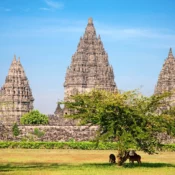
London Indian Film Festival expands its remit beyond London and India

Village Rockstars, Courtesy of LIFF.
The London Indian Film Festival returned last week for its ninth year, with screenings and events across London, as well as in Birmingham and Manchester.
Sponsored by the Bagri Foundation, a non-profit set up to support Asian art and culture, and supported by the British Film Institute (BFI), the festival opened with the world premiere of Love Sonia, a harrowing film about two sisters forced into sex trafficking, which took director Tabrez Noorani – a producer in Danny Boyle’s 2009 hit Slumdog Millionaire – ten years to make. Following its second screening at the BFI’s cinema complex at London’s Southbank Centre, Tabrez Noorani along with producer David Womark, who worked on of Life of Pi (2012) and members of the cast took part in a Q&A with the audience about the film and rich insight into the process of making it.
Mrunal Thakur (Sonia), who won the award for Best Newcomer in the festival’s closing ceremony, spoke about her research for the role – interviewing sex workers in Calcutta and observing body language in the red light district. Meanwhile, Richa Chadda (Madhuri), recognised with the Outstanding Achievement award, discussed the film’s conscious effort to convey sex trafficking as more than just an Indian issue, but a global one. This turned into an intimate discussion which helped helped the audience process the gravity of the film’s content.
Manoj Bajpayee – who performed in Love Sonia, as well as Gali Guliyan (In the Shadows), a psychological thriller set in Old Delhi – was one of two winners of the 2018 “Icon Award” for outstanding contribution to Indian and world cinema. The other was Irrfan Khan, who came to global renown in Slumdog Millionaire, and appeared in two films at the LIFF (Bangladeshi-Indian co-production Doob: No Bed of Roses and Anup Singh’s Song of Scorpions, a film set in the deserts of rural Rajasthan).

Hva Vil Folk Si, Courtesy of LIFF.
Other highlights from the festival include Eaten By Lions, which followed half-brothers Omar (Antonio Aakeel) and Pete (Jack Carroll) as they travelled to the British seaside resort of Blackpool looking for Omar’s biological father, and won the Audience Award.
The festival included a tribute to the late Indian film star Sridevi, with a screening of her 1987 cult classic Mr India. It also made a refreshing effort to broaden the focus beyond just India to South Asia as a whole, including Pakistani and Bangladeshi independent films, too.

Sridevi in Mr India, Courtesy of LIFF.
This year, the films were clustered around three themes: “the Female Eye, “Fathers and Sons”, and “Extraordinary Lives”. The first category showcased six female filmmakers, including Rima Das, whose cheerful Village Rockstars follows the story of a young girl in north-eastern India who wants to become a rockstar. The Fathers and Sons strand was woven through many of the festival’s films, and often intersected with topics such as toxic masculinity and violence against women.
The Extraordinary Lives strand was particularly compelling, with films such as Lokesh Kumar’s My Son Is Gay, a Tamil-language film about a teenage boy coming out and his mother’s struggle to accept him, screened in partnership with Queer Asia and the SOAS South Asia Institute, and director Iram Haq’s Pakistani-Norwegian film Hva Vil Folk Si (“What Will People Say”), which teenager Nisha’s struggle for autonomy when her father sends her to Lahore because of his disapproval of her lifestyle in Oslo.

The Peanut Seller, Courtesy of LIFF.
The LIFF annual Satyajit Short Film Competition and Award shortlists six short films examining South Asian experiences, offering £1,000 to emerging filmmakers. Siddharth Chauhan was the 2017 winner for his short Papa, a story of a mother and son coming to terms of death and disability.
This year there were seven shortlisted films, which displayed various accounts of South Asian “Extraordinary Lives” through topics such as gender, LGBTQ, family, and sexual violence. Among the highlights were Abhishek Verma’s The Fish Curry, an animated film about a young man preparing his father’s favourite dish before he plans to come out to his parents over dinner, and Vijay Kumar’s Paro, about a young girl whose family sold her as a bride. On the closing night of the festival, Etienne Sievers’ The Peanut Seller (Moongfali Wala) won this year’s award with a story about a young man living in the streets of New Delhi, searching for the man who knows how to find his mother. Sievers artfully depicted the isolation of this young man despite the minimal time, and particularly salient throughout these short films was the various ways in which each character manoeuvred exceptional obstacles.





